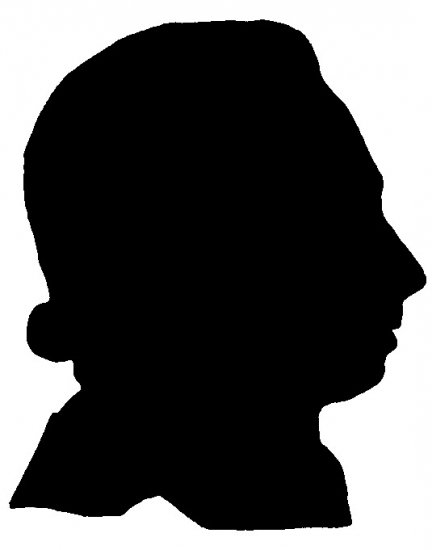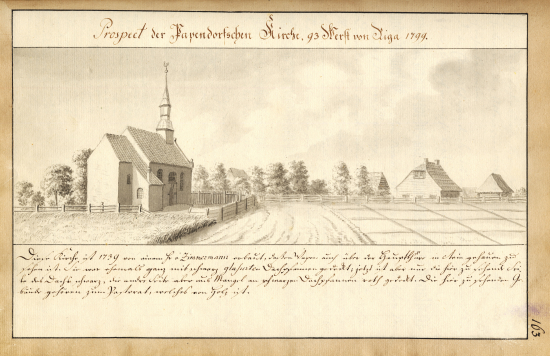Christof Harder
06.12.1747 – 16.08.1818
Christof
Harder (Harder, 1747 –1818) – German origin Lutheran pastor in Rubene
(Papendorf). A representative of the Enlightenment, rationalist,
writer, publisher, author of the first "Vidzemes' Calendar".
He actively worked and insisted in education of Latvian peasants:
repeatedly published Latvian ABC written by himself, was an author of
the first arithmetic book in Latvian. Harder mainly worked in the
field of secular literature, especially introducing peasants to their
rights and obligations. He translated the recipes from German and
prepared the first cookbook in Latvian. His contribution is important
also in the field of Latvian linguistics: he created numerous new
words and terms in different thematic fields, as well in contributed
to language research. Chr. Harder participated in collection of
Latvian folklore and creation of first folk-song collections.
Birth time/place
06.12.1747
Kaļiņingrada
Place/time of death
16.08.1818
Miršanas un atdusas vietas nav zināmas.
Personal information
Father
– Peter Harder – a beer brewer in Königsberg. mother - Anna
Tester. Brother - Johann Jacob Harder (1734-1775) – a
representative of Baltic Enlightenment, German pastor, educator and
translator, researcher of Latvian intangible cultural heritage. His
most important work on Latvian cultural heritage is a research
article on old Latvian religious services, science, forms of
governing and language (In German (original): Untersuchung des
Gottesdienstes, der Wissenschaften, Handwerke, Regierungsarten und
Sitten der alten Letten aus ihrer Sprache) that was published in
newspaper "Gelehrte Beiträge zu den "Rigischen Anzeigen"
in 1764. The brothers are often easily confused. He married the daughter of the rector of the Valmiera School J.H. Block, Catherine Elizabeth Block in 1787.
Having
finished the studies on Königsberg, Chr. Harder came to Livonia.
During his work in Riga, he was a member of so-called Berens circle,
where Enlightenment ideas were present and many important people
gathered, e.g. later philosophers J.G. Herder and J.G. Hamann,
publisher J.F. Hartknoch, historian J.K. Brotze, etc. Presumably,
this circle inspired Chr. Harder to collect Latvian folk-narratives,
folksongs, as well to research the issues related to the Latvian
language.
As
he began his work at the Rubene Church, Chr. Harder became friends
with V.D. Budberg (1740–1784), a well-educated painter of
German-Baltic origin, who was also a poet and the owner of the
Ķieģeļu
Manor
at Rubene parish. In 1781, Budberg in collaboration with Chr. Harder
establisheda printing house in the manor. After the death of the
landlord, in 1784, Chr. Harder moved the printing house to Rubene
rectory. He published the first 9 issues of the Vidzeme Calendar,
including various educational texts of a timely content, promoting
the dissemination of the latest scientific knowledge, as well as
opinions on socio-political issues (peasant rights, education, etc.).
He
promoted numeracy and literacy skills among Latvian peasants,
although he saw the aftermath of the peasant unrests of 1777, during
which Latvian peasants filed written complaints about the landlords,
thus triggering counter strike of the former to peasant education.
Together
with M.G. Loder
published
"The Preacher at the Investigation of the Judges of the Latvian
Nation" (1786), under the guise of various Christian texts, he
calls upon Latvian farmers who serve as associate judges to become
more responsible, courageous, and not to submit to the influence of
the supreme power. He continues his discussion on the rights of
Latvian farmers in the appendices to the "Vidzeme Calendar".
This is probably the reason why "Vidzeme Calendar for 1790"
is republished without penalty by J.K.D. Miller, who continues to
publish it in the following years.
Despite
educating farmers in their rights and teaching them to calculate the
bills needed for daily household needs as well as finances related to
manors, such as had tax, he considered active peasant unrest a sheer
impudence.
In
response to the pastor of Jaunpiebalga, C.R. Girgenson’s call to
read reflections on the Latvian language at Church Conventions to,
Chr. Harder came up with a plan to establish the Latvian Society
which created the platform for the "Latvian Friends Society").
Chr. Harder was elected the head of the Latvian Society.
Professional activity
Professional activities
Pastor in Rubene Church,From 1806: prsest of Valmiera district.
Literary activities
Original works1781-1790: "Vidzeme calendar", with supplements. The issues of the first editions are closely related to the publisher's personal attitude to the events in Livonia and feature work in Latvian linguistics, as well as educational articles.The articles published in 1787-1790: “Patents and Orders that Farmers Have to Know”, where Harder arbitrarily inserted his thoughts and explanations into the official text might have been the reason why the publisher from Riga, J.K.D. Miller, continued to publish the calendar. Several literary scholars consider the fall of "Vidzeme calendar" into other hands to be the first literary theft in Latvian literary history
1782: " New Holy Songs"
1782: leaflet "For pub visitors" - poetry with anti-alcoholism propaganda, not preserved
1784: "Latvian Alphabet" (reprints 1785, 1796), with the first addition of a multiplication table
1786: Co-author of J.G. Loder's work "The Preacher at the Investigation by Associate Judges from the Latvian Folks", which emphasizes the responsibility of associate judges - Latvian peasants
1788: "Explaining the teachings" - Lutheran Catechism for peasants of Rubene Parish
1790: "Anmerkungen und Zusatze zu der neuen lettischen Grammatik des Herrn Probst Stender" ("Notes and Supplements to Stender's New Latvian Grammar), work in Latvian linguistics, reprinted in 1809.
1795: "The First Cookbook", for the chefs of manors
1806: "The Book for Counting not for those dark minds, but for the those who appreciate wisdom and bright minds
1809: contributed to the editing of Lutheran hymnal "Christian songs, sung in churches and at home" in Vidzeme. It contains 22 songs written by Chr. Harder. Only the pastor of Jaunpiebalga K.R. Girgenson contributed more songs (87).
Translations
1804: "Laws for the peasants of Vidzeme" explaining the duties and rights of peasants"
Manuscripts
Handwritten additions to G. F. Stender’s dictionary were published by A. Wellig in "Beitrage zur lettischen Sprachkunde" ("Articles in Latvian Linguistics", 1828).
Contribution in folkloristics
Harder collected Latvian folklore. His collection of folk songs is included in the folk song collections "Erste Sammlung lettischer Sinngedichte" and "Zweite Sammlung Lettischer Sinn-oder Stegreif Gedichte" published by Rujiena pastor G. Bergmann. In total, his contribution to the two collections comprises about one hundred texts. He might have been one of the collaborators who, with the help of J.B. Fisher, sent Latvian folk songs to the philosopher J.G. Herder in the mid-1870s. He also collected beliefs, stories and tales of the Latvian people.Quotes
"Harder
was a profoundly intelligent man with a strong social sense, who
followed closely the spiritual currents of the age."
Apinis
A. Soļi
senākās latviešu grāmatniecības un kultūras takās: apcerējumi.
R .: Press House, 2000, p.326. lpp.
Chr.
Harder in response to Vidzeme Superintendent K.G. Zontag's question
about pastoral proposals for school reform:
"
If you cannot give anything particularly good, then it is better to
leave the old one in place; do not tear down an old building until
funds have been collected and a plan for building a new castle has
been worked out”
Schwab
A. Kāda
mācītāja dzīve.
Stockholm: Daugava, 1985, p. 53.
Quote
from K. Harder's "Calculus book" (1806):
Believe
me, too, that calculating gives you some true fun. When a good, quick
witted lad who loves to count, spends a few good hours at this book
doing these equations; when he has solved those, and the correct
answer comes to light, indeed, sometimes he would rather refuse a
glittering dalder for the joy he feels over these calculations, while
others were looking for joy in the pubs and got a blue eye and
cracked bones there.
K.
Harder on his work at the Latvian Society, when writing to C.G.
Sonntag:
"I
have neither gold nor silver, but what I own, some knowledge of the
Latvian language, I'd be happy to share [at this wonderful event]."
Schwab
A. Kāda
mācītāja dzīve.
Stockholm: Daugava, 1985, p.63.
Affinities
Johans Jakobs Harders - Brother
Name at birth
Harder
Education
1758–1764
Kneiphof Gymnasium, lat. Schola Cathedralis, lat. Domgymnasium
Kaļiņingrada
Saskaņā ar Hardera autobiogrāfiju, skolā mācās sešus gadus. No: Curriculum
vitae Christophori Harder, S.S.Theol.Candidati. Rokr. AB R MS1112, 10, I-24/
I-25, nr. 28.
1764–1767
University of Königsberg
Kaļiņingrada
Sākotnēji klausījies lekcijas filosofijā un matemātikā, t.sk. pie metafizikas un loģikas profesora Frīdriha Johana Buka (Buck, 1722-1786), kas tiecies gan uz reliģiju, gan dabaszinātnēm raudzīties no filosofijas viedokļa. No profesora Buka ieguvis arī zināšanas matemātikā un astronomijā. Brāļa Johana Jākoba Hardera iespaidā Kristofs Harders pievērsās teoloģijas studijām.
Working place
1767–1772
Rīga
Pēc studijām Kēnigsbergā, sekojot brālim, ierodas Rīgā un strādā par mājskolotāju kāda Rīgas vācu pilsoņa ģimenē, domājams, Rīgā iemācās latviešu valodu un ar brāļa atbalstu iesaistās brāļu Bērensu namā rīkotajās sanāksmēs jeb t.s. Bērensu pulciņā.
1772–1817
Rubenes evaņģēliski luteriskā draudze
Mācītājs Rubenes draudzē. No 1806. gada Valmieras apriņķa prāvests.
1781–1796
Kristofa Hardera (Rubenes) spiestuve
Rubene
Spiestuve tika dibināta, pateicoties Hardera draudzībai ar Baltijas vācu gleznotāju un Rubenes draudzē ietilpstošās Ķieģelu (Ķiegaļu) muižas īpašnieku Voldemāru Dītrihu fon Budbergu-Benninghauzenu (von Budberg-Bönninghausen, 1740–1784). 1784. gadā, Harders spiestuvi pārcēla uz Rubenes mācītājmuižu. Grāmatas iesēja un iespieda pats Kristofs Harders, lielākā daļa no tām bija latviešu valodā, t.sk. "Vidzemes kalendārs", ābece, aritmētikas grāmata, gramatika un pavārgrāmata. Zināms 21 izdevums, no tiem 18 laicīga satura. Daļa grāmatu tika izdalītas par brīvu, tās palīdzēja izplatīt arī draudzes trūkumcietēji. Mājas rokas spiestuves darbību, līdzīgi kā citu privāto spiestuvju darbību, aizliedza Krievijas impērijā ar likumu 1796. gadā.
1806–1818
Vidzemes konsistorija
Valmieras apriņķa prāvests
Participation in organisations
1767–1772
Brāļu Bērensu pulciņš
Mārstaļu iela, Rīga
Pēc brāļa Johana Jākoba Hardera ieteikuma apmeklē pulciņa sanāksmes.
07.1811–1818
Lettische Gesellschaft
Vidzeme
Biedrības vadītājs, tas centrā latviešu valodas izpēte un latviešu rakstu gatavošana. Biedrība darbojas dažādās Vidzemes mācītājmuižās, dibināta Cēsīs.







